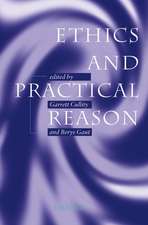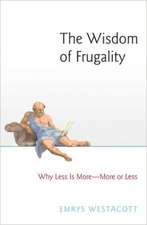Morality, Leadership, and Public Policy: On Experimentalism in Ethics: Bloomsbury Research in Political Philosophy
Autor Professor Eric Thomas Weberen Limba Engleză Paperback – 19 dec 2012
| Toate formatele și edițiile | Preț | Express |
|---|---|---|
| Paperback (1) | 256.12 lei 6-8 săpt. | |
| Bloomsbury Publishing – 19 dec 2012 | 256.12 lei 6-8 săpt. | |
| Hardback (1) | 889.55 lei 6-8 săpt. | |
| Bloomsbury Publishing – 4 mai 2011 | 889.55 lei 6-8 săpt. |
Preț: 256.12 lei
Nou
Puncte Express: 384
Preț estimativ în valută:
49.01€ • 52.41$ • 40.86£
49.01€ • 52.41$ • 40.86£
Carte tipărită la comandă
Livrare economică 17 aprilie-01 mai
Preluare comenzi: 021 569.72.76
Specificații
ISBN-13: 9781441144812
ISBN-10: 1441144811
Pagini: 208
Ilustrații: 1 illus
Dimensiuni: 156 x 234 x 10 mm
Greutate: 0.3 kg
Editura: Bloomsbury Publishing
Colecția Bloomsbury Academic
Seria Bloomsbury Research in Political Philosophy
Locul publicării:London, United Kingdom
ISBN-10: 1441144811
Pagini: 208
Ilustrații: 1 illus
Dimensiuni: 156 x 234 x 10 mm
Greutate: 0.3 kg
Editura: Bloomsbury Publishing
Colecția Bloomsbury Academic
Seria Bloomsbury Research in Political Philosophy
Locul publicării:London, United Kingdom
Caracteristici
Applies the work of such thinkers as Rawls and Dewey to practical policy problems.
Notă biografică
Eric Thomas Weber is assistant professor of Public Policy Leadership at the University of Mississippi, USA. He has published in Human Studies, Review of Policy Research, Skepsis, William James Studies, Contemporary Pragmatism, and Transactions of the Charles S. Peirce Society. He is the author of Rawls, Dewey, and Constructivism (Continuum, 2010).
Cuprins
1. Introduction \ Part I: Philosophy and Religion in Public Policy \ 2. On Applying Ethics: Who's Afraid of Plato's Cave \ 3. Religion, Public Reason and Humanism: Kurtz on Fallibilism and Ethics \ Part II: Experimentalism, Problem Construction and Priorities \ 4. What Experimentalism Means in Ethics \ 5. Construction, Art and Politics \ 6. Philosophy and Public Policy Prioritization \ Part III: New Technologies and Experiments in Judging \ 7. Stop Him! He Stole My Internet Connection! \ 8. Activist vs Active Judges: Examples of Experimentalists \ 9. Conclusion \ Bibliography \ Index.
Recenzii
'If there was ever any doubt that philosophy belongs to the real world - in the realm of legislatures and leadership - Weber's book lays it to rest. By a marvelously rich development of the pragmatic experimental method, the author shows how philosophy can make central contributions to dealing with some of our most vexing moral problems. Lucid thinking and accessible style make the book's lasting insights unmistakable. A must-read for both philosophers and community leaders.' - John Lachs, Centennial Professor of Philosophy, Vanderbilt University, USA
'I cannot urge strongly enough the consideration of this ingenious, well-written study for inclusion in the policy curriculum. We seldom have a book that is both original and practical, and this work is both. We have a major problem in the world today, a shortfall in ethical understanding that is producing dire consequences for every level of government. We need to spark interest in the ethical dimensions of policy studies, and Professor Weber has provided us with both the spark and the tinder. I will make good use of his study, and hope others will too.' - Paul Rich, President, Policy Studies Organization
'Eric Weber has written a much-needed book. Many commentators lament the prevalence of ideological rigidity in American politics. At the same time, defenders of ideological rigidity often defend rigidity as a consequence of a genuinely "ethical" approach to the great issues of public policy. They often equate compromise with ethical weakness. In Morality, Leadership and Public Policy, Weber convincingly refutes any notion that ethical leadership need be dogmatic by appealing to the most genuinely American of philosophical traditions. Weber's book shows great sensitivity to both the complexity of public policy formation and to the subtleties of philosophical ethics. His book deserves to be read by both policy makers and philosophers.' - David Shrader, Executive Director, The American Philosophical Association
The book leaves...positive impressions, especially for those working in the area of public policy... Throughout the book, Weber provides those in the area of public policy and leadership with an approach (experimentalism) that will allow them to reach different conclusions... What is also fascinating is the way in which he deals with areas that are seen as somewhat 'out of the box' when it comes to public policy and morality as a study under philosophy... The author has articulated his point clearly.
Morality, Leadership, and Public Policy is written in an engaging manner. So filled is it with clear and powerfully compelling ideas and suggestions that one cannot read the book without finding oneself examining one's habitual ways of approaching difficulties and seeking new possibilities for meaningful collaboration with others in fashioning public policy. Although Weber writes explicitly for philosophers, his work can also be read with benefit by non philosophers who are concerned with the moral dimensions of public policy and leadership. Morality, Leadership, and Public Policy is, accordingly, a suitable and desirable acquisition for both academic and public libraries.
'I cannot urge strongly enough the consideration of this ingenious, well-written study for inclusion in the policy curriculum. We seldom have a book that is both original and practical, and this work is both. We have a major problem in the world today, a shortfall in ethical understanding that is producing dire consequences for every level of government. We need to spark interest in the ethical dimensions of policy studies, and Professor Weber has provided us with both the spark and the tinder. I will make good use of his study, and hope others will too.' - Paul Rich, President, Policy Studies Organization
'Eric Weber has written a much-needed book. Many commentators lament the prevalence of ideological rigidity in American politics. At the same time, defenders of ideological rigidity often defend rigidity as a consequence of a genuinely "ethical" approach to the great issues of public policy. They often equate compromise with ethical weakness. In Morality, Leadership and Public Policy, Weber convincingly refutes any notion that ethical leadership need be dogmatic by appealing to the most genuinely American of philosophical traditions. Weber's book shows great sensitivity to both the complexity of public policy formation and to the subtleties of philosophical ethics. His book deserves to be read by both policy makers and philosophers.' - David Shrader, Executive Director, The American Philosophical Association
The book leaves...positive impressions, especially for those working in the area of public policy... Throughout the book, Weber provides those in the area of public policy and leadership with an approach (experimentalism) that will allow them to reach different conclusions... What is also fascinating is the way in which he deals with areas that are seen as somewhat 'out of the box' when it comes to public policy and morality as a study under philosophy... The author has articulated his point clearly.
Morality, Leadership, and Public Policy is written in an engaging manner. So filled is it with clear and powerfully compelling ideas and suggestions that one cannot read the book without finding oneself examining one's habitual ways of approaching difficulties and seeking new possibilities for meaningful collaboration with others in fashioning public policy. Although Weber writes explicitly for philosophers, his work can also be read with benefit by non philosophers who are concerned with the moral dimensions of public policy and leadership. Morality, Leadership, and Public Policy is, accordingly, a suitable and desirable acquisition for both academic and public libraries.
Descriere
Descriere de la o altă ediție sau format:
Argues the practical benefits for public policy of a rigorous experimentalist approach to applying moral theory. This book surveys the uses of practical philosophy and answers criticisms of the approach, presenting a number of areas in which philosophers' intellectual efforts can prove valuable for resolving public conflicts.
Argues the practical benefits for public policy of a rigorous experimentalist approach to applying moral theory. This book surveys the uses of practical philosophy and answers criticisms of the approach, presenting a number of areas in which philosophers' intellectual efforts can prove valuable for resolving public conflicts.






































